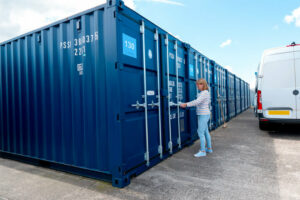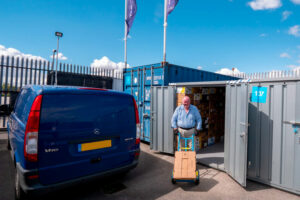How much does self-storage cost?

Are you curious about self-storage and how much it costs?
If so, this is the perfect blog post for you. We’re going to dive into the world of self-storage in a way that’s easy to understand.
Let’s get started.
Self-storage is a fantastic solution for people who need a little extra space to keep their belongings safe. Picture this: you have an overflowing collection of toys that are no longer used, or your family is moving to a new home and you need somewhere to store your things for a while. This is where self-storage comes to the rescue.
Understanding the cost of self-storage is crucial because it allows you to make smart choices about where and how to store your items.
In this blog post, we’ll break down the various factors that influence self-storage costs, share some money-saving tips, and discuss the different types of self-storage available.
Factors Affecting Self Storage Costs

Several things can impact how much you’ll pay for self-storage. Let’s explore these factors one by one.
Location
Where your self-storage unit is located can significantly affect the price. As with houses and flats, some areas are pricier than others. For instance, renting a storage unit in a bustling city like London might be more expensive than in a smaller town or a rural area.
Unit Size
The size of the storage unit you need also plays a role in the cost. It’s pretty simple: the bigger the unit, the more it will cost. Luckily, there are various sizes to choose from, so you can find the perfect fit for your needs.
To help you select the right size, think about how much you need to store. If you have only a few boxes, a smaller unit will probably work better. But if you need to store lots of furniture, you might require a large unit.
Duration
The length of time you need the storage unit also affects the cost. Some people only need storage for a short period, such as a few weeks, while others require it for months or even years. The longer you rent the unit, the more it will cost overall. However, some storage companies offer discounts for long-term rentals.
Here at Storebox, we offer storage for just a month.
Amenities and Security
Different self-storage companies provide various features to improve your storage experience. Some have climate-controlled units, meaning they can regulate the temperature and humidity inside the unit. This is great for storing delicate items like artwork, musical instruments or electronics.
Security is also vital, as you want your belongings to be safe. Some storage companies have security cameras, alarm systems and even guards to keep an eye on the facility.
These additional features can increase the price, but they also help protect your belongings and keep them in good condition.
Insurance
Many storage companies require you to have insurance to cover your belongings while they’re in storage. You can either purchase insurance through the storage company or use your existing insurance policy, as long as it covers stored items. The cost of insurance varies based on the value of your belongings and the coverage you choose.
Access and Convenience
Storage facilities that offer 24-hour access or drive-up access can be more expensive than those with limited access hours. However, these features can make it more convenient to access your belongings whenever you need them. If you need frequent access to your storage unit, you might want to consider a facility that offers these options.
Part 2: Types of Self Storage

In addition to the factors that affect the cost, there are also different types of self-storage to consider.
Here are some common options:
Traditional Self Storage Units
These are the most common types of storage units. They come in various sizes and you can usually access them during the facility’s operating hours. Traditional self-storage units are great for storing household items, furniture and other belongings that don’t require special care or conditions.
Climate-Controlled Units
As mentioned earlier, climate-controlled units maintain a consistent temperature and humidity level. These units are ideal for storing items that are sensitive to temperature changes or moisture, such as artwork, antiques, electronics, and delicate fabrics. Keep in mind that climate-controlled units can be more expensive than traditional units.
Outdoor Storage
Outdoor storage is an option for those who need to store large items like vehicles, boats or trailers. These storage spaces are typically uncovered, but some facilities offer covered or indoor options for added protection from the elements. Outdoor storage can be more affordable than renting an extra-large indoor unit.
Mobile Storage
Mobile storage, also known as portable storage or “pod” storage, involves a storage container delivered to your home or business. You can fill the container at your convenience, and the storage company will pick it up and store it at their facility or transport it to your new location. This type of storage can be more expensive, but it offers the convenience of packing and loading at your own pace.
Typical Price Ranges for Self Storage in the UK
Now that we know what influences self-storage costs and the different types available, let’s look at some average price ranges in the UK. Remember, these prices are just estimates and can vary depending on the factors we discussed earlier.
Small units: These units are perfect for storing a few boxes or small pieces of furniture. Prices can range from £10 to £30 per week.
Medium units: If you need more space, medium units can hold the contents of a small flat or a few rooms. Prices can range from £30 to £60 per week.
Large units: For those with lots of belongings, large units can store the contents of a whole house. Prices can range from £60 to £100 per week.
Extra-large units: These are the biggest units available and can store many large items, like cars or boats. Prices can range from £100 to £200 per week.
Keep in mind that these prices are just examples, and the actual cost may differ depending on the location, company and other factors we talked about earlier.
Part 4: Tips for Saving Money on Self Storage
Everyone loves saving money, right?
Here are some tips to help you get the best deal on self-storage:
Shop around for the best deal: Just like when you’re shopping for clothes or a new car, it’s a good idea to compare prices from different storage companies. Check their websites or give them a call to find out their prices and what they offer.
Only pay for the space you need: Be smart about choosing the right size unit for your stuff. Remember, the bigger the unit, the more it costs, so make sure you only pay for the space you actually need.
Take advantage of discounts and promotions: Some storage companies offer special deals or discounts for new customers, long-term rentals or even students. Keep an eye out for these promotions to save some money.
Consider sharing a unit with a friend or family member: If you know someone who also needs storage space, you can share a unit and split the cost. This way, both of you can save money.
Declutter before renting a storage unit: Before you rent a storage unit, take some time to sort through your belongings and decide what you really need to keep. By getting rid of things you no longer want or need, you can save money by renting a smaller unit.
Be flexible with location: If you don’t need to access your storage unit frequently, consider renting a unit in a less popular or more rural area. These locations often have lower rental rates compared to units in big cities or popular areas.
Rent during off-peak times: Some storage facilities offer lower rental rates during off-peak times, such as winter months or weekdays. If your schedule allows, take advantage of these lower rates to save money.
Look for referral discounts: Some storage companies offer discounts for referring friends or family members. If you know someone who’s looking for a storage unit, both of you might be able to save some money through referral discounts.
Pack efficiently: By packing your belongings efficiently, you can maximise the space in your storage unit and potentially rent a smaller, less expensive unit. Use sturdy boxes, fill empty spaces with smaller items or packing material and stack boxes strategically to make the best use of the available space.
Pay in advance: Some storage facilities offer discounts if you pay for several months or a year in advance. If you have the funds available and know you’ll need the storage unit for an extended period, consider paying upfront to save money in the long run.
Summary
We’ve covered a lot of information about self-storage costs, types of storage, and money-saving tips in this blog post. We hope that by breaking it down into simple terms, you have a better understanding of what affects the price and how to make the best decision for your storage needs.
So, the next time you or someone you know needs extra space to store their belongings, you’ll know what to look for, the different types of storage available and how much it might cost. Don’t forget to do your research, compare prices, and take advantage of any discounts or promotions you find.
Happy storing, and remember that Storebox can help with any of your storage needs. We also offer a collection and removal service, so that you don’t even need to leave your home!